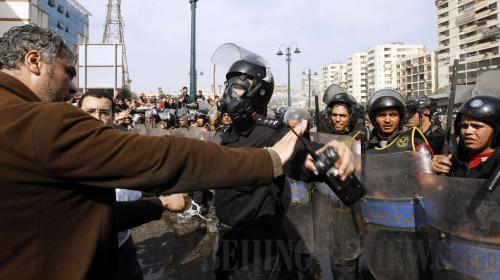|
 |
|
CLASH: Egyptian protesters confront riot police during a demonstration in Cairo on January 28 (XINHUA/AFP) |
A political tornado, which gained unexpected strength in Egypt, has spread rapidly, with anti-government demonstrations erupting in may Arab countries. The geopolitical situation in the region has caught the world's attention. Egypt, an influential Arab country in the Middle East, has particularly attracted attention.
Causes
Three reasons for the Egyptian unrest can be identified: heightened social conflicts; worries that former President Hosni Mubarak would institute a hereditary system of leadership; and a corrupt Egyptian Government.
What happened in Egypt was not a military coup or an Islamic "holy war." The protests were not provoked by external forces, either. Instead, people took to the streets mainly because of problems concerning their livelihoods. The government headed by Mubarak had lost the trust of the people. The political atmosphere was not democratic enough, and economic development was slow. People had lived a hard life for a long time due to skyrocketing prices and high unemployment. All these factors sharpened social conflicts.
The Muslim Brotherhood in Egypt, founded in 1928, is known as the world's most influential Islamic movement. But there was no sign the organization was behind these protests. In fact, the protests were sparked by young Egyptian people without the support of any organization or political party. Initial protests were staged by a group of laid-off youths on January 25. Later, more and more people joined, causing the situation to spiral out of control.
The protests were targeted squarely at Mubarak, who had served as Egyptian president for nearly 30 years. Protesters demanded he step down immediately. Protests broke out in big cities like Cairo, Alexandria and Suez, causing conflicts between protesters and riot police.
Massive protests had significant implications for Egypt's political, economic, diplomatic and security situation, leading to Mubarak's resignation on February 11.
The Mubarak age ended in a dramatic way. His departure illustrated how sharp Egypt's social conflicts are. Statistics in 2009 showed the country's poverty rate was as high as 36 percent. Chronic social problems, mainly caused by poverty, have led to a rich-poor disparity. Plus, the country's unemployment and inflation rates have remained high. Therefore, it was inevitable that popular discontent would eventually lead to social unrest.
During Mubarak's long term in office, people's living conditions deteriorated instead of getting better. Egyptians worried that he might create a hereditary system of leadership by transferring power to his son, Gamal.
At first, Mubarak took measures to adapt to the changed political situation. For instance, he clearly expressed he had no inclination to run for president during the next election. He said he would step down when his term finished in September, and his son Gamal would not be a presidential candidate. He also suggested amending the Constitution to lower presidential candidates' qualification threshold and put a limit to the president's term.
He even quickly carried out a major government reshuffle. On January 29, Prime Minister Ahmed Nazif and his cabinet collectively resigned on Mubarak's request. Former Aviation Minister Ahmed Shafiq was appointed prime minister and authorized to form a new cabinet. Former intelligence chief Omar Suleiman was named vice president, which was the first time Mubarak had appointed a vice president since he came into power in 1981.
But Mubarak's efforts were too late. Protesters couldn't wait until the election in September because they were afraid of possible changes. They insisted Mubarak step down immediately, because once Mubarak was not in office, there would be no possibility for his son to inherit power.
Serious corruption of government officials, including Mubarak, was also an important reason. Western media reports say Mubarak's personal wealth has been estimated at $20 billion-70 billion, about 30-50 percent of Egypt's annual national income.
Responding to protesters' calls to combat corruption, former Interior Minister Habib al-Adly, former Housing Minister Ahmed Maghrabi, former Tourism Minister Zuheir Garana and steel giant Ahmed Izz were arrested on February 17 and their assets were frozen. The four were charged with several crimes such as money laundering, abuse of power and speculation. Four days later, Mubarak and his families' assets and bank accounts at home and abroad were frozen, pending further investigation.
| 